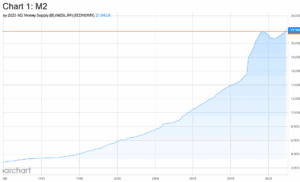The market has changed in the wake of the pandemic. Retail trading is up dramatically. So is options activity. And narrative is driving returns much more than fundamentals are, which is a continuation of a trend that started well before then. We are all seeing things happening in the market that we have never seen in our investing careers.
Making sense of all of it has been challenging for even the most seasoned professional investors. For your average investor, it is even more difficult. We have all heard that “this time is different” can be the four most dangerous words in investing. But “this time is never different” can be an equally dangerous five.
As an investor who invests based on fundamentals, I have spent a lot of time thinking about what this means. I can’t say that process has generated any definitive answers, but I have come up with a few key takeaways that have helped me better deal with a world in which fundamentals may matter less than they have in the past (at least in the short-term).
Here are some ideas to help deal with a changing market.
[1] Look at the Other Side
Throughout my career, I have regularly referenced the Ben Graham idea that the market is a voting machine in the short run and a weighing machine in the long run. So I started out very skeptical of the idea that markets had changed and fundamentals were less important. But as I thought about it, I realized the better way to think about this concept is an idea I took from Ben Hunt and Rusty Guinn on the Epsilon Theory podcast. That idea is that the market is always a voting machine. Sometimes that voting is based on fundamentals, sometimes it isn’t. The movement of the market is determined by flows and by buyers and sellers. Since investing in a stock is just buying a partial ownership of a company, you would certainly expect those buyers and sellers to eventually care about the earnings and cash flows they are buying. But there is no rule that has to occur over any specific timeframe. The voting could go on for much longer than any of us think before the weighing comes in. Recognizing that fact is an important first step prior to figuring out what can be done about it.
[2] Understand Your Time Frame
We had Corey Hoffstein of Newfound Research on our podcast a while back to discuss his paper Liquidity Cascades. That paper clearly lays out many of the things that have changed in the market in recent years and how things like option dealer hedging are much more important now than they used to be. We asked him what his advice would be for your average investor with respect to dealing with the changing market and he explained that the answer is a function of an investor’s timeframe. For an investor with a 30- year time frame, the recent changes in the market are probably not something to worry about. Even if these effects persist for a long time, you would expect things to normalize over a time frame like that. For investors with shorter time frames, his advice was to spread your bets to ensure that you have strategies that will work in a variety of potential future environments. And that brings me to my final idea.
[3] Use Momentum
There is a saying in investing that price is truth. That idea can be the most useful for all of us when the truth is in opposition to our own opinions. Momentum doesn’t care about why something is going up. It only cares that it does. If the market cares about fundamentals, then momentum will too. If it doesn’t, then momentum won’t. For an investor whose primary strategy relies on analyzing company fundamentals (particularly a value investor), momentum can be an excellent complement because it won’t spend time trying to analyze the way the world should be, it will just accept the way it is and ride that trend. As a result, it offers an interesting hedge against a world where the tie between market prices and fundamentals is not what is has been in the past and outside forces may be playing a bigger role in driving stock returns.
The Future of Fundamentals
I am a believer that fundamentals ultimately drive stock prices. So my gut reaction to a period like the one we have gone through in recent years is to think that it will be a temporary one and that fundamentals will ultimately matter again, just as they have in the past. But I have learned that it is important to always look at the other side, even for my strongest held beliefs. And there is compelling evidence that the market has changed. I don’t think that means that fundamental-based strategies should be abandoned. But I do think that they should be analyzed to see where they can be improved or adapted to the current environment without violating their core principles. These ideas have helped me do that.
—
September 29, 2021 – Three Ideas to Help Fundamental Investors Weather a Flows Based Market
Disclosure: Interactive Brokers Third Party
Information posted on IBKR Campus that is provided by third-parties does NOT constitute a recommendation that you should contract for the services of that third party. Third-party participants who contribute to IBKR Campus are independent of Interactive Brokers and Interactive Brokers does not make any representations or warranties concerning the services offered, their past or future performance, or the accuracy of the information provided by the third party. Past performance is no guarantee of future results.
This material is from Validea Capital Management and is being posted with its permission. The views expressed in this material are solely those of the author and/or Validea Capital Management and Interactive Brokers is not endorsing or recommending any investment or trading discussed in the material. This material is not and should not be construed as an offer to buy or sell any security. It should not be construed as research or investment advice or a recommendation to buy, sell or hold any security or commodity. This material does not and is not intended to take into account the particular financial conditions, investment objectives or requirements of individual customers. Before acting on this material, you should consider whether it is suitable for your particular circumstances and, as necessary, seek professional advice.



















Join The Conversation
For specific platform feedback and suggestions, please submit it directly to our team using these instructions.
If you have an account-specific question or concern, please reach out to Client Services.
We encourage you to look through our FAQs before posting. Your question may already be covered!